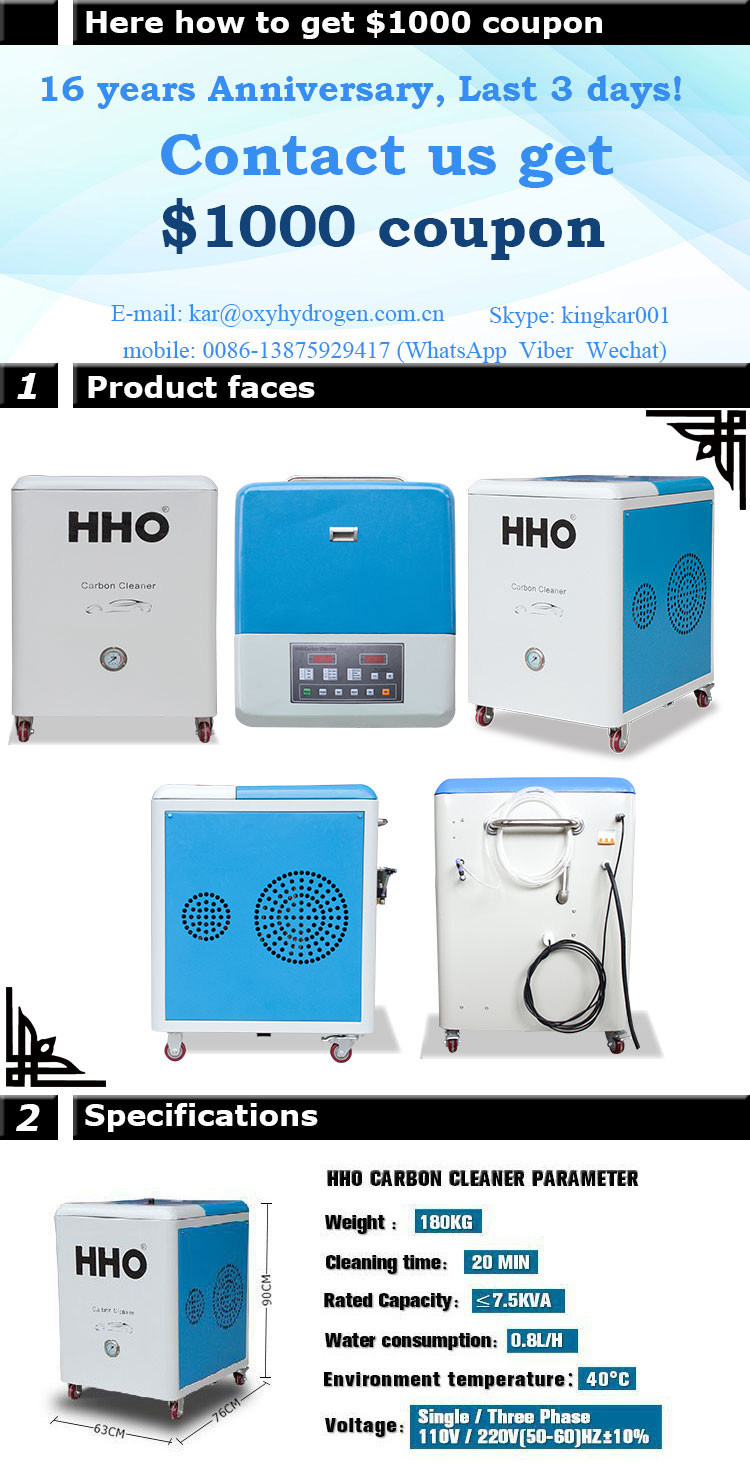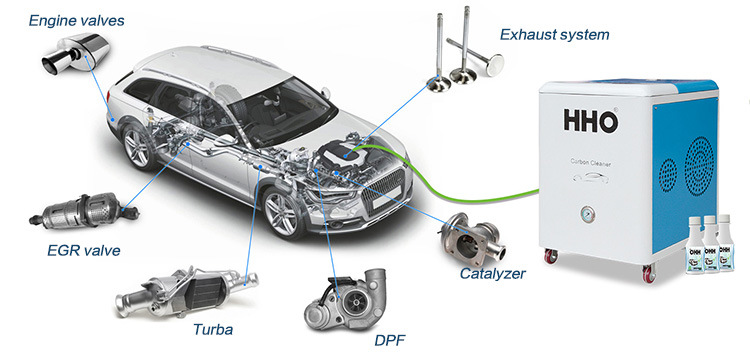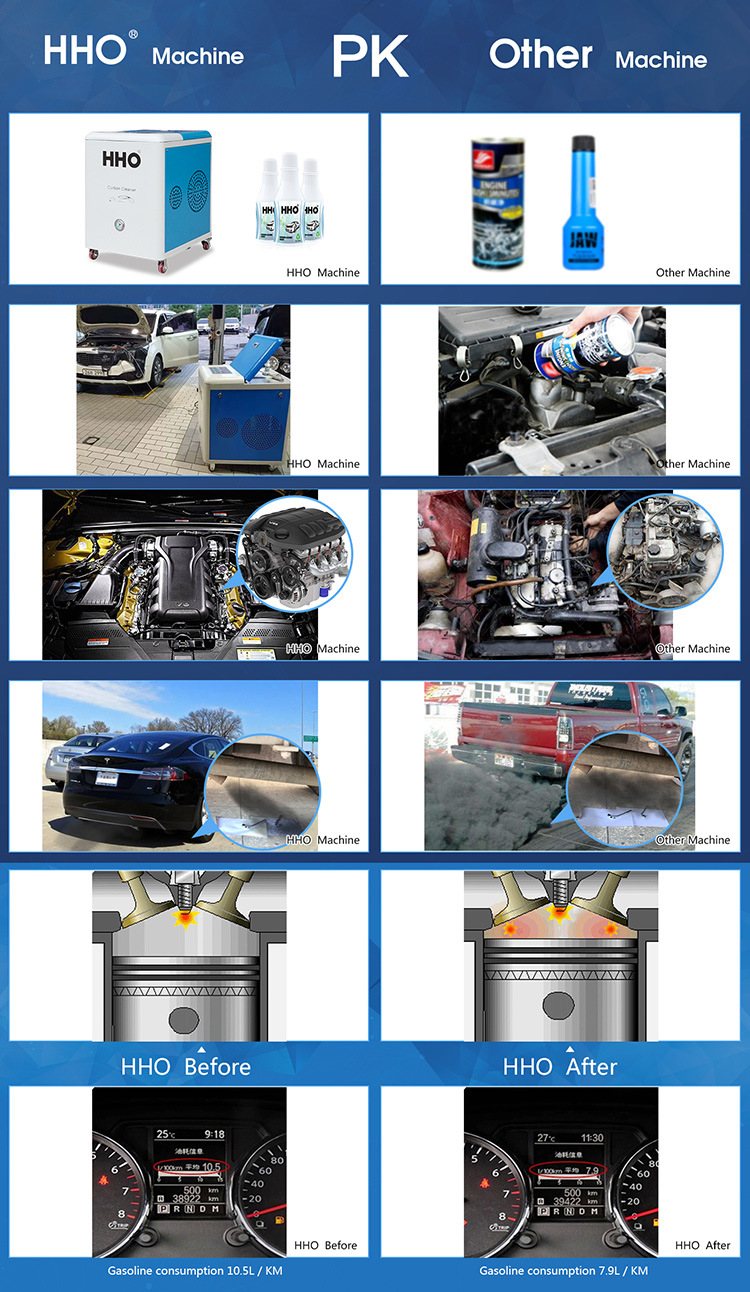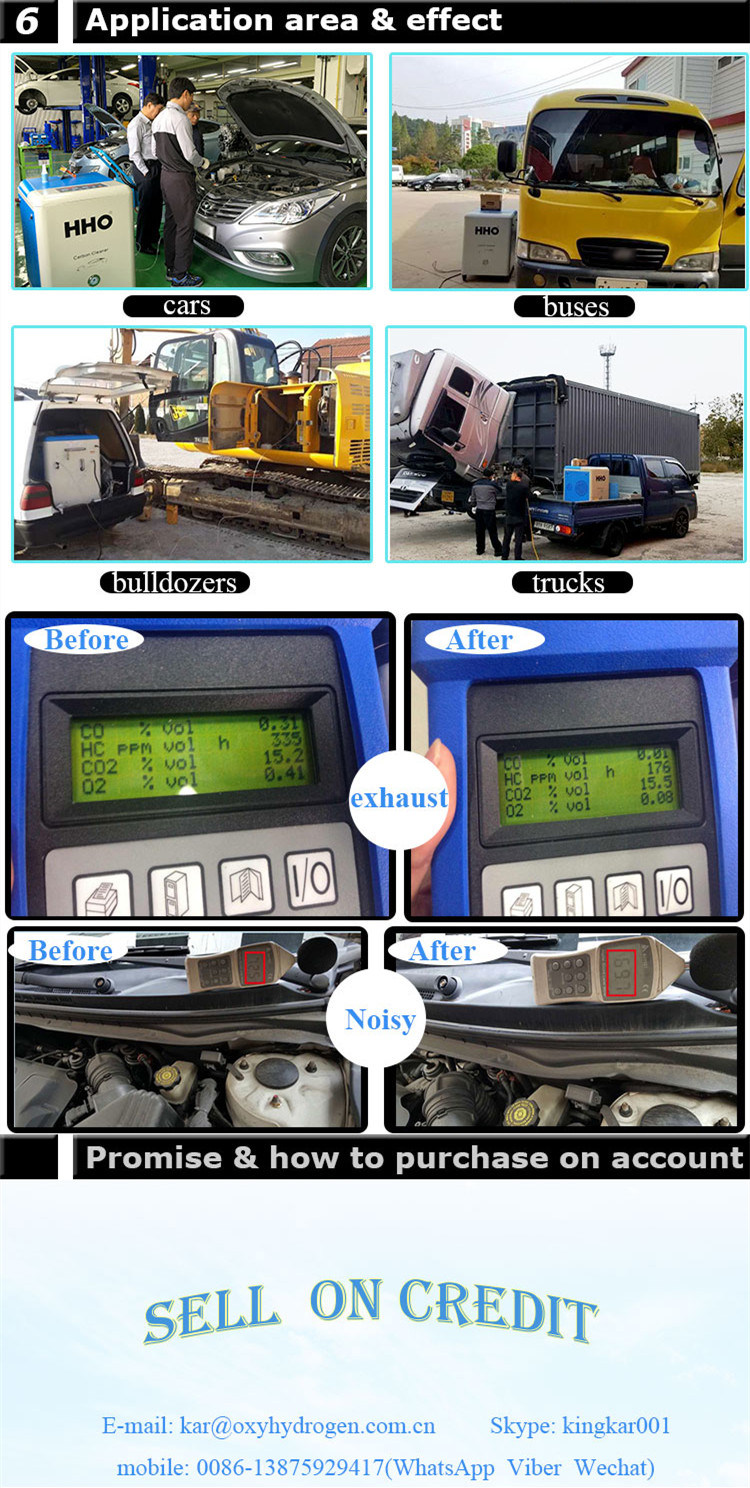**Hydrogen Generator Exhaust System Cleaning Machine for Car Engine**

Over 100 automobile maintenance product suppliers, car service centers, repair shops, 4S stations, and auto dealers have partnered with us. Each time they perform engine carbon cleaning, they can earn between USD 50 to USD 100 per vehicle.
If you clean 10 cars per day, you can make USD 1,000 daily, USD 30,000 monthly, and USD 360,000 annually!
With just two machines, your earnings could double or even more.
Kingkar Company guarantees that your investment will be returned within one month. If not, you can return the machine without any cost.
The Principle:
Principle 1: Cell Reaction
Anode reaction: 4OH⻠→ 2H₂O + O₂↑ + 4e⻠(OH⻠comes from the ionization of KOH)
Cathodic reaction: 2H⺠+ 2e⻠→ H₂↑ (H⺠comes from water ionization)
Principle 2: Water-Hydrogen Circulation Principle
The hydrogen generator uses a KOH aqueous solution as the raw material to produce a 2:1 ratio of hydrogen mixed combustible gas through electrolysis. This process generates active atoms such as O²â», Hâº, and OHâ». These active atoms act as catalysts to break down long hydrocarbon chains, ultimately resulting in a complete water-hydrogen cycle.





**Product Specifications:** - **Model No.:** HHO 6.0 - **Feature:** Non-Toxic - **Condition:** New - **Customized:** Yes - **Voltage(V):** Three-Phase 380V / 220V (50-60)Hz ±10% - **Working:** Continuous - **Flame Temperature(T):** 800-2000°C (Adjustable) - **Working Pressure(MPa):** ≤0.08 - **Environment Temperature(T):** 0-40°C - **Power Supply Protection Grade:** IP21s - **Insulation Protection Grade:** F - **Carbon Cleaning Medium:** Oxy-Hydrogen Molecules Decarbonizer - **Keyword:** Exhaust System Cleaning Machine for Car Engine - **Guarantee:** 10 Years - **Trademark:** HHO - **Transport Package:** Wooden Carton Box - **Specification:** CE and ISO 9000 - **Origin:** Hunan, China - **HS Code:** 84051000 This machine is ideal for automotive workshops, service stations, and repair shops looking to offer efficient and eco-friendly engine carbon cleaning services. It’s a smart investment that delivers quick returns and supports sustainable practices. Whether you're starting a new business or expanding an existing one, this hydrogen generator offers a reliable and profitable solution.
1. **By Material**:
- **Metal Gaskets**: Such as stainless steel gaskets and copper gaskets, suitable for high-temperature and high-pressure working environments.
- **Non-metallic Gaskets**: Including rubber gaskets (e.g., NBR nitrile rubber), silicone gaskets, and polytetrafluoroethylene (PTFE) gaskets. These gaskets are typically used under lower temperature and pressure conditions.
- **Composite Material Gaskets**: Combining the advantages of both metal and non-metal materials, such as metal-jacketed gaskets (with a metal outer layer and non-metallic fillers inside). They offer good temperature resistance and elasticity.
2. **By Shape and Structure**:
- **Flat Gaskets**: The simplest form, usually circular or square, with a wide range of applications.
- **Wavy Gaskets**: Designed with specific wave patterns to increase elasticity and improve sealing performance.
- **Serrated Gaskets**: With serrated surfaces that can better fit into uneven contact areas, enhancing the seal.
- **O-rings**: Circular cross-section ring-shaped seals, particularly suitable for dynamic sealing applications.
3. **By Application**:
- **General-purpose Gaskets**: Suitable for most conventional situations.
- **Special-purpose Gaskets**: Designed for specific industries or working conditions, such as food-grade gaskets and corrosion-resistant gaskets.
4. **By Manufacturing Process**:
- **Molded Gaskets**: Directly formed using molds.
- **Cut Gaskets**: Cut from sheets according to the required dimensions.
- **Spiral-wound Gaskets**: Alternately wound with V-shaped or W-shaped metal strips and non-metallic fillers, suitable for high-temperature and high-pressure applications.

Over 100 automobile maintenance product suppliers, car service centers, repair shops, 4S stations, and auto dealers have partnered with us. Each time they perform engine carbon cleaning, they can earn between USD 50 to USD 100 per vehicle.
If you clean 10 cars per day, you can make USD 1,000 daily, USD 30,000 monthly, and USD 360,000 annually!
With just two machines, your earnings could double or even more.
Kingkar Company guarantees that your investment will be returned within one month. If not, you can return the machine without any cost.
The Principle:
Principle 1: Cell Reaction
Anode reaction: 4OH⻠→ 2H₂O + O₂↑ + 4e⻠(OH⻠comes from the ionization of KOH)
Cathodic reaction: 2H⺠+ 2e⻠→ H₂↑ (H⺠comes from water ionization)
Principle 2: Water-Hydrogen Circulation Principle
The hydrogen generator uses a KOH aqueous solution as the raw material to produce a 2:1 ratio of hydrogen mixed combustible gas through electrolysis. This process generates active atoms such as O²â», Hâº, and OHâ». These active atoms act as catalysts to break down long hydrocarbon chains, ultimately resulting in a complete water-hydrogen cycle.





**Product Specifications:** - **Model No.:** HHO 6.0 - **Feature:** Non-Toxic - **Condition:** New - **Customized:** Yes - **Voltage(V):** Three-Phase 380V / 220V (50-60)Hz ±10% - **Working:** Continuous - **Flame Temperature(T):** 800-2000°C (Adjustable) - **Working Pressure(MPa):** ≤0.08 - **Environment Temperature(T):** 0-40°C - **Power Supply Protection Grade:** IP21s - **Insulation Protection Grade:** F - **Carbon Cleaning Medium:** Oxy-Hydrogen Molecules Decarbonizer - **Keyword:** Exhaust System Cleaning Machine for Car Engine - **Guarantee:** 10 Years - **Trademark:** HHO - **Transport Package:** Wooden Carton Box - **Specification:** CE and ISO 9000 - **Origin:** Hunan, China - **HS Code:** 84051000 This machine is ideal for automotive workshops, service stations, and repair shops looking to offer efficient and eco-friendly engine carbon cleaning services. It’s a smart investment that delivers quick returns and supports sustainable practices. Whether you're starting a new business or expanding an existing one, this hydrogen generator offers a reliable and profitable solution.
Gaskets are widely used sealing materials in fields such as machinery and pipeline connections, primarily for filling gaps between two objects to prevent the leakage of fluids or gases. Depending on the material, application environment, and functional requirements, gaskets can be categorized into several types. Below is an introduction to some common classifications of gaskets:
1. **By Material**:
- **Metal Gaskets**: Such as stainless steel gaskets and copper gaskets, suitable for high-temperature and high-pressure working environments.
- **Non-metallic Gaskets**: Including rubber gaskets (e.g., NBR nitrile rubber), silicone gaskets, and polytetrafluoroethylene (PTFE) gaskets. These gaskets are typically used under lower temperature and pressure conditions.
- **Composite Material Gaskets**: Combining the advantages of both metal and non-metal materials, such as metal-jacketed gaskets (with a metal outer layer and non-metallic fillers inside). They offer good temperature resistance and elasticity.
2. **By Shape and Structure**:
- **Flat Gaskets**: The simplest form, usually circular or square, with a wide range of applications.
- **Wavy Gaskets**: Designed with specific wave patterns to increase elasticity and improve sealing performance.
- **Serrated Gaskets**: With serrated surfaces that can better fit into uneven contact areas, enhancing the seal.
- **O-rings**: Circular cross-section ring-shaped seals, particularly suitable for dynamic sealing applications.
3. **By Application**:
- **General-purpose Gaskets**: Suitable for most conventional situations.
- **Special-purpose Gaskets**: Designed for specific industries or working conditions, such as food-grade gaskets and corrosion-resistant gaskets.
4. **By Manufacturing Process**:
- **Molded Gaskets**: Directly formed using molds.
- **Cut Gaskets**: Cut from sheets according to the required dimensions.
- **Spiral-wound Gaskets**: Alternately wound with V-shaped or W-shaped metal strips and non-metallic fillers, suitable for high-temperature and high-pressure applications.
gasket, industrial gasket, sealing gasket, gasket manufacturer, heat-resistant gasket
Siping Juyuan Hanyang Plate Heat Exchanger Co., Ltd , https://www.tj-heatexchange.com